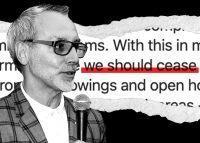 "It's a moral obligation": Compass' Leonard Steinberg calls for two-week ban on showings
"It's a moral obligation": Compass' Leonard Steinberg calls for two-week ban on showings
Trending
Top resi agents dish on second homes, virtual showings
Gomes, Steinberg, Lippman clash on reality TV but agree that New York will bounce back
With New York real estate shut down, the industry’s residential agents have had time to think about how their market recovered after 9/11 and the 2008 financial crisis. The comeback from Covid-19 could be different, some say, in that shelter-in-place has reinforced the importance of our abodes.
“As tragic as it is, this moment is probably the first trillion-dollar PR event to broadcast the meaning and value of having a home,” said Compass’ Leonard Steinberg on Monday’s edition of The Real Deal’s new webinar series.
“It’s a biblically scaled tragedy,” Steinberg noted from his home in Waccabuc, a hamlet in northern Westchester. “I’m trying to be positive but there’s nothing that can be said or done to belittle the anguish people are feeling.”
To discuss how agents are staying on top of business while sheltering at home, TRD’s Erin Hudson caught up via Zoom with Steinberg, Brown Harris Stevens’ Lisa Lippman and Douglas Elliman’s John Gomes.
Read more
 "It's a moral obligation": Compass' Leonard Steinberg calls for two-week ban on showings
"It's a moral obligation": Compass' Leonard Steinberg calls for two-week ban on showings
 Virtual showings only: State clarifies “essential business” announcement
Virtual showings only: State clarifies “essential business” announcement
Gomes, speaking from his home in Litchfield, Conn., described the situation as surreal. “I almost can’t believe it’s real,” he said. “I’ve gotten so accustomed to the new abnormal, it’s becoming quite normal.”
“I’m doing well and I don’t take it for granted at all,” said Lippman, who is hunkering down in Kent, Conn., and said unequivocally that she will not go back to work until agents get the all-clear from state health officials.
The others also weighed in on in-person showings, a topic that has become a flashpoint in the industry. Last week, the Cuomo administration appeared to take the position that brokers could do in-person showings, but reversed its stance a day later.
Steinberg had been against showings from the outset and had taken heat in the industry for saying agents have a “moral obligation” to stay home. In the panel discussion Steinberg doubled down on that position.
“It’s wording based on fact and data,” he said. “I do hear some insanity that’s permeating our industry [but] that has to be tempered with patience, calm and rational thinking based on science and data that is telling us loudly and clearly to limit contact with other human beings.”
Lippman said she didn’t have much faith in virtual showings. “New York real estate is too interesting, too unique and too expensive, frankly,” she said. But Gomes insisted virtual showings and other digital tools would change transactions in the future.
To cut down on initial visits that prove pointless, a first, in-person showing may be replaced by a virtual one, said Gomes. “We’re scratching the surface with these videos we’re trying to put together at the last minute. When we come out of this, we’re going to be doing a lot of digital, virtual-type showings,” he said. “It’s going to be yet another tool agents have to sell their properties.”
Steinberg made the case for using virtual-reality technology to showcase a property with expansive grounds. He said television has trained consumers to shop for property, but that over-the-top programming has also had a downside.
“I think the shows have broadcast a perception of agents that are horrific” and “unbelievably damaging” to the industry. “The consumer deserves better, rather than [believing] a fantasy of signing contracts from helicopters.”
It was lost on no one that Gomes’ fellow team leader Fredrik Eklund stars on “Million Dollar Listing: New York. Gomes came to the show’s defense.
“While you may think it’s tacky, there are a lot of people who are exposed to our industry in a way they’ve never been before,” he said. “It’s reality TV, and TV is meant to entertain. And by the way, look at the way it showcases some of these properties. Some of the homes look spectacular.”
While such shows romanticize brokerage, all three panelists said the narrative that real estate agents routinely make millions of dollars is false. “Most don’t make big money,” said Lippman, noting that agents are entitled to unemployment benefits under the $2 trillion stimulus. “That’s how it works in any other industry.”
Indeed, not all agents will stay in the business through the pandemic. “Some will simply not be able to survive this,” said Gomes.
He said in 2008, the economically tumultuous year when he and Eklund were just getting started, they looked at the downturn as an opportunity to dig in. Now he is telling agents on his 100-person team to do the same.
“We keep saying, ‘You’ve got to look at this as an opportunity,’” he said. “Think about the other side of the pandemic.”
At several points, the agents reflected on how New York real estate recovered after September 11 and the financial crisis. “I don’t want to say it too many times, but 9/11 was a direct onslaught on New York City,” said Lippman. “The first month or so after 9/11, we had buyers walk away from deposits. By January, things were really busy.”
Steinberg noted that he made “the best real estate investment” of his life in October 2001.
Although all three are working remotely, Lippman said she’s putting together videos of her listings. Gomes is doing minimal marketing, but did send an e-blast for new developments he’s representing. “I do have a fiduciary responsibility,” he said. “It’s important that we gently remind people.”
Steinberg said the first group of buyers to emerge will be looking for bargains. Many will be interested in a second home outside of New York City.
“Look at Lisa, John and myself,” he said, referring to the fact that all three were broadcasting from homes outside the city. “There are so many reasons now why having a nest somewhere and a sense of security will expand dramatically,” he added. “The focus on home and security will just blossom.”




